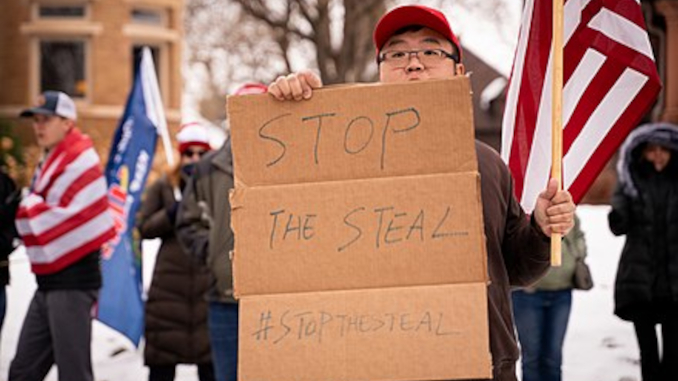
By Donald Jeffries
The fact that there are still many districts counting votes—well over a week after the midterm elections—as I write this tells us all we need to know about the corruptibility of the voting process. There is the further fact that, in seemingly every case where the counting drags on incomprehensibly, the Democratic candidate eventually prevails.
Electoral fraud has been an unfortunate tradition throughout American history. In the 1865 presidential election, Abraham Lincoln was widely forecast to lose to Democrat George McClellan. Lincoln ordered his officers to deny furloughs to suspected Democratic voters among the Northern troops. He somehow won New York state, which was a hotbed of anti-Lincoln sentiment. As Gen. Benjamin “Beast” Butler boasted in a letter to Lincoln’s psychotic Secretary of War Edwin Stanton, “I have done all I could to stop secessionists from voting in New York.”
In 1876, Democrat Samuel Tilden won the popular vote, and was ahead in the Electoral College. The election was thrown into the House of Representatives, where the Republican majority simply declared the remaining states for Tilden’s opponent, Rutherford B. Hayes. As a concession to Democrats, they finally agreed to end Reconstruction in the South.
In the 1948 U.S. Senate race, Lyndon Johnson earned the derisive nickname “Landslide Lyndon,” when after several recounts, he wound up “winning” by 87 votes. It is said that the future president trudged through cemeteries with his aides, and instructed them to copy down the names from tombstones. When he was questioned about this, LBJ snorted, “They have the same right to vote as everybody else.”
And, of course, in the 2000 election, it was the Democrats who rightfully cried foul, when after weeks of waiting, the Supreme Court simply declared George W. Bush the winner over Al Gore.
It was during Barack Obama’s 2008 presidential campaign that we first heard rumors of more people voting in a particular district than existing registered voters there. That would become a commonplace occurrence, the “new normal” in our increasingly dubious elections.
There was not an abundant amount of visible fraud in the 2008 or 2012 presidential elections, primarily because the Republicans nominated two of the worst candidates imaginable, John McCain in 2008 and Mitt Romney in 2012. Few Republicans felt that either of them could have legitimately won over Barack Obama, who was widely popular with Democrats. In the 2012 Republican primaries, the party hierarchy did everything it could to stymie the surging campaign of then-Rep. Ron Paul, who drew enthusiastic crowds everywhere, and won every single online poll of Republican candidates by huge margins. Still, officially it was claimed he never won a single primary.
After a 2016 campaign that shockingly saw Donald Trump win over the “Queen of Corruption,” Hillary Clinton, the Democrats protested loudly. “Not my president” demonstrations were held. Hillary devised the “Russiagate” fantasy, as has been revealed in a memo from then-CIA Director John Brennan.
But it wasn’t until the 2020 election that millions of Americans, ignorant of the history previously cited here, saw the system stripped bare, in all its corrupt and crooked glory. Mail-in ballots were pushed as never before, with the purported Covid-19 pandemic as an excuse. States like Pennsylvania permitted undated ballots to be counted, which opened the door to massive fraud. No court, including the Supreme Court, would even look at the evidence accumulated by Trump’s lawyers.
Since no reforms were made following the 2020 fiasco, and American citizens remain imprisoned, denied all due process almost two years later, it was hardly surprising that no predicted “red wave” occurred. As in 2020, mail-in ballots, with dates or verified signatures no longer required, reigned supreme. Because they are still presumably rolling in, no one questions why all the votes haven’t been counted yet, over a week after the election.
In Arizona, Blake Masters, the Republican Senate candidate, alleged that at least one box of counted votes was mixed in with the uncounted, so that they were counted again. In the same state, the nearly invisible candidate Katie Hobbs was declared the winner, a week after the election, over the dynamic Kari Lake, who had been far ahead in pre-election polls. Hobbs, as attorney general, just happened to be in charge of overseeing the voting process, and refused to recuse herself.
As one wit online noted: How can you ever change vote fraud if the fraud prevents you from winning elections?
It isn’t likely that anyone outside of Rep. Marjorie Taylor Greene and Rep. Chip Roy are likely to allege fraud in the 2022 midterms. No one wants to be like the Jan. 6 political prisoners, jailed without charges, allegedly subjected to beatings and solitary confinement. It would take strong collective leadership on the part of the Republicans to demand real reforms. Clearly, such leadership doesn’t exist.
As Josef Stalin noted long ago, “Those who vote decide nothing. Those who count the vote decide everything.”





